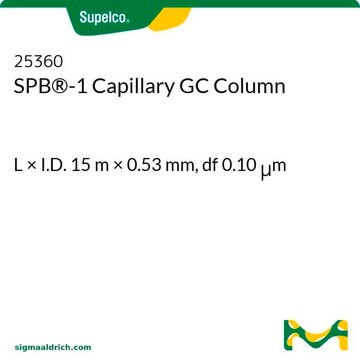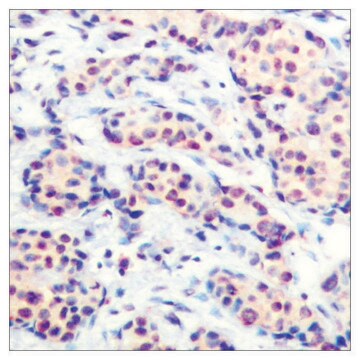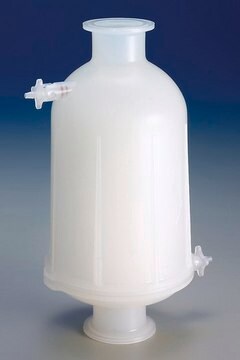Especificidad
Clone ST126 is a mouse monoclonal antibody that detects human Interferon a.
Inmunógeno
A full-length purified human interferon-a produced by human Burkitt lymphoma Namalwa cell line.
Aplicación
Quality Control TestingEvaluated by Western Blotting with recombinant human IFN- a2.Western Blotting Analysis: A 1:1,000 dilution of this antibody detected recombinant human IFN-a2.Tested ApplicationsNeutralizing: A representative lot of this antibody neutralized the antiviral activity of Interferon-a. (Shearer, M., et. al. (1984). J Immunol. 133(6):3096-101).ELISA Analysis: A representative lot detected Interferon-a in ELISA applications (Shearer, M., et. al. (1984). J Immunol. 133(6):3096-101).Radioimmunoassay: A representative lot detected Interferon-a in Radioimmunoassay applications (Shearer, M., et. al. (1984). J Immunol. 133(6):3096-101). Immunohistochemistry (Paraffin) Analysis: A 1:50 dilution from a representative lot detected Interferon-a in human kidney and human stomach cancer tissue sections.Note: Actual optimal working dilutions must be determined by end user as specimens, and experimental conditions may vary with the end user
Anti-Interferon-a, clone ST126, Cat. No. MAB413-I, is a mouse monoclonal antibody that detects Interferon alpha-2 and is tested for use in ELISA, Immunohistochemistry (Paraffin), Neutralizing, Radioimmunoassay, and Western Blotting.
Descripción de destino
Interferon alpha-2 (UniProt: P01563; also known as IFN-alpha-2, Interferon alpha-A, LeIF A) is encoded by the IFNA2 (also known as IFNA2A, IFNA2B, IFNA2C) gene (Gene ID: 3440) in human. Interferons are divided into three families (type I, II, and III) based on their sequence homology. Type I is the largest group that includes Interferons a and b are the primary defensive cytokines against pathogens and display strong antiviral activities. They also display anti-bacterial and anti-cancer properties. IFN-a is rapidly induced and secreted by cells to limit virus replication through numerous and varied mechanisms, including the induction of intrinsic restriction factors. IFN-a2 is produced by macrophages with a signal peptide (aa 1-23), which is subsequently cleaved off to generate the mature active form. It is produced in response to viral infection and triggers the induction of protective genes that inhibit viral replication and impede viral dissemination. IFN-a2 is shown to be an effective agent against hepatitis viruses. Chronic administration of IFN-a is shown to cause the regression of vascular neoplasms, including hemangiomas, Kaposi′s sarcoma, and pulmonary hemangiomatosis. (Ref.: Lavender, KJ., et al. (2016). J, Virol. 90(13); 6001-6013).
Forma física
Purified mouse monoclonal antibody IgG2b in PBS without azide.
Almacenamiento y estabilidad
Stable for 1 year at -10°C to -25°C from date of receipt. Handling Recommendations: Upon receipt and prior to removing the cap, centrifuge the vial and gently mix the solution. Aliquot into microcentrifuge tubes and store at -20°C. Avoid repeated freeze/thaw cycles, which may damage IgG and affect product performance.
Otras notas
Concentration: Please refer to the Certificate of Analysis for the lot-specific concentration.
Cláusula de descargo de responsabilidad
Unless otherwise stated in our catalog or other company documentation accompanying the product(s), our products are intended for research use only and are not to be used for any other purpose, which includes but is not limited to, unauthorized commercial uses, in vitro diagnostic uses, ex vivo or in vivo therapeutic uses or any type of consumption or application to humans or animals.






